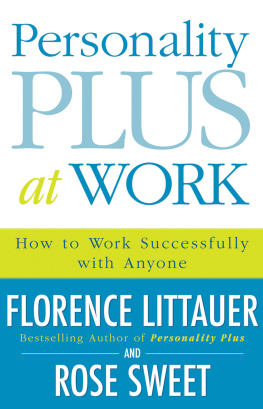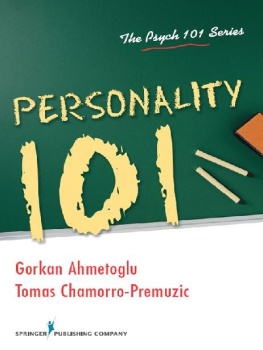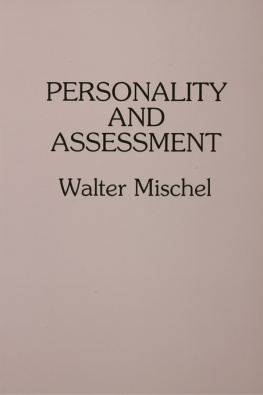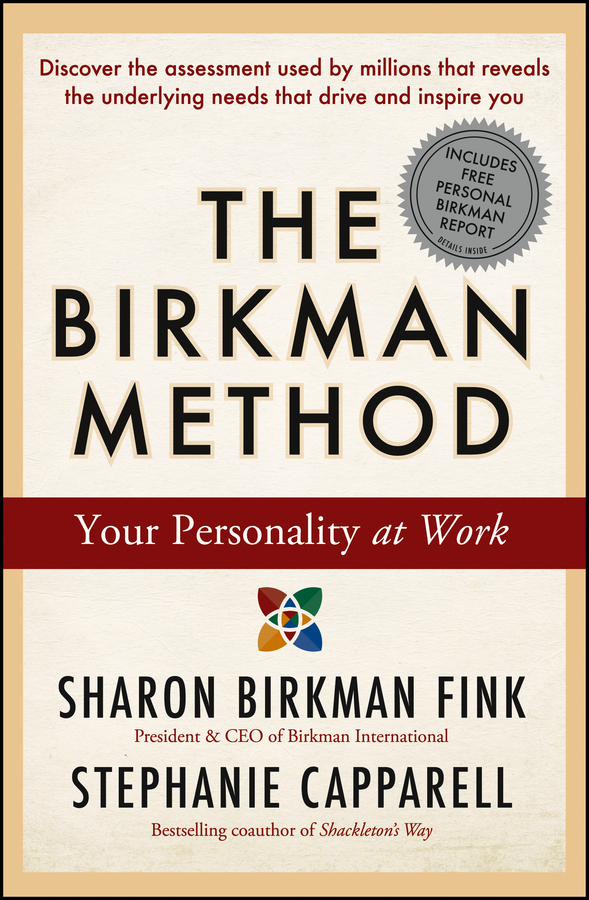Contents
Praise for The Birkman Method
Its critical to know the things that make a person tick. Once you understand the individuals you work with each day, you can give greater opportunity to your employees and create a more powerful team. The Birkman Method is an easy read that provides thought-provoking insights and understanding.
Steve Lufburrow, CEO, Goodwill Industries of Houston
The Birkman Method is a tool that provides awareness, understanding, and wisdom for anyone on a learning journey. The power of the Birkman is its ability to make sense of the stories we tell of our interactions with others, which forms the basis of who we are and how we act. This wonderful book shares these stories so that all can relate.
Kelly D. Bean, assistant dean, UCLA Anderson Executive Education
Beliefs and perceptions are such dangerous thingsthey can cost you so much. The Birkman Method helps me recognize them in myself and in others, but more important, it provides a framework for talking about them in an open, nonconfrontational way. I simply dont know what I would do without the Birkman.
Justin Parer, managing director, Pi Strategic Management
The Birkman Methods unique approach sets it apart from any other psychometric assessment tool. Eleven years and 4,500 completed assessments later, we continue to rely on it to add value to our companys individual development and team-building efforts on an ongoing basis.
Margie Poole, senior organizational development consultant, CenterPoint Energy
Building strong leaders and exceptional teams are table stakes for competing successfully in our industry. The Birkman Method has been an invaluable tool for us in supporting this mission for an extended period of time.
John Farrell, senior director of organizational development, Marathon Oil Company

Copyright 2013 by John Wiley & Sons, Inc. All rights reserved.
Published by Jossey-Bass
A Wiley Brand
One Montgomery Street, Suite 1200, San Francisco, CA 94104-4594 www.josseybass.com
No part of this publication may be reproduced, stored in a retrieval system, or transmitted in any form or by any means, electronic, mechanical, photocopying, recording, scanning, or otherwise, except as permitted under Section 107 or 108 of the 1976 United States Copyright Act, without either the prior written permission of the publisher, or authorization through payment of the appropriate per-copy fee to the Copyright Clearance Center, Inc., 222 Rosewood Drive, Danvers, MA 01923, 978-750-8400, fax 978-646-8600, or on the Web at www.copyright.com . Requests to the publisher for permission should be addressed to the Permissions Department, John Wiley & Sons, Inc., 111 River Street, Hoboken, NJ 07030, 201-748-6011, fax 201-748-6008, or online at www.wiley.com/go/permissions .
Limit of Liability/Disclaimer of Warranty: While the publisher and author have used their best efforts in preparing this book, they make no representations or warranties with respect to the accuracy or completeness of the contents of this book and specifically disclaim any implied warranties of merchantability or fitness for a particular purpose. No warranty may be created or extended by sales representatives or written sales materials. The advice and strategies contained herein may not be suitable for your situation. You should consult with a professional where appropriate. Neither the publisher nor author shall be liable for any loss of profit or any other commercial damages, including but not limited to special, incidental, consequential, or other damages. Readers should be aware that Internet Web sites offered as citations and/or sources for further information may have changed or disappeared between the time this was written and when it is read.
Jossey-Bass books and products are available through most bookstores. To contact Jossey-Bass directly call our Customer Care Department within the U.S. at 800-956-7739, outside the U.S. at 317-572-3986, or fax 317-572-4002.
Wiley publishes in a variety of print and electronic formats and by print-on-demand. Some material included with standard print versions of this book may not be included in e-books or in print-on-demand. If this book refers to media such as a CD or DVD that is not included in the version you purchased, you may download this material at http://booksupport.wiley.com . For more information about Wiley products, visit www.wiley.com .
Library of Congress Cataloging-in-Publication Data
Birkman Fink, Sharon, 1950
The Birkman method : your personality at work / Sharon Birkman Fink, Stephanie CapparellFirst edition.
pages cm
Includes bibliographical references and index.
ISBN 978-1-118-20701-7 (cloth); ISBN 978-1-118-41937-3 (ebk); ISBN 978-1-118-42111-6 (ebk); ISBN 978-1-118-63759-3 (ebk)
1. Birkman Method of Personality Testing. 2. Personality. 3. Psychology, Industrial. I. Capparell, Stephanie. II. Title.
BF698.8.B47F56 2013
155.283dc23
2012049928
To Roger W. Birkman,
a man of vision whose genuine love for people
inspired him to spend a lifetime
perfecting a way for each of us
to see our full potential
and work together in harmony
Preface
Understanding and retaining people is most often cited as the number one challenge in business, and the top question leaders ask is: How do we hire, manage, and retain our people? While running a business may be hard, it turns out that managing people is even harder.
This is the reason people turn to the Birkman personality assessment: to improve their lives and their working relationships with those closest to them. For more than six decades, millions of individuals have used our positive-psychology tool in over fifty countries, and our client list has grown to include Fortune 500 companies, nonprofit groups, educational and faith-based organizations, mom-and-pop shops, couples, and families. As CEO of Birkman International, I receive e-mails daily from consultants around the world and across the United States.
The story of the Birkman Method begins with the story of my father, Roger Birkman. Growing up as the shy and thoughtful son of a Lutheran pastor, he was fascinated by people and a keen observer of them. As a B-17 bomber pilot during World War II, he saw the power of wide-ranging personal perceptions and the impact of different styles on people and their behaviors.
Returning from the war, he was swept into the booming field of social psychology. Alongside such figures as Benjamin Fruchter, Warren Bennis, and Abraham Maslow, my father was a pioneer in taking psychology to the workplace, a radical new concept at the time. He developed the Birkman Method by asking a variety of workers questions about themselves and how they did their jobs. These interviews of people in the workplace, from salesmen and truck drivers to janitors and top executives, formed the basis of his positive-psychology questionnaire, first called A Test of Social Comprehension.
By the 1960s, my father, who always loved technology, put the research data from his test takers responses on an IBM mainframe computer. These data enabled him to expand into the global workplace, tracking generational changes as well as shifting trends. Most important, the information shows how all individual employees shape corporate cultures and fit into a grander scheme.
But my father didnt do it alone. Soon after returning from the war in 1944, he was fortunate to meet a young woman in the Womens Army Corps at a Veterans Administration picnic. Margaret Sue Leath shared his passion for understanding people and believed in his mission from the beginning. They married a year later, and she worked alongside him until her death in 2007.











